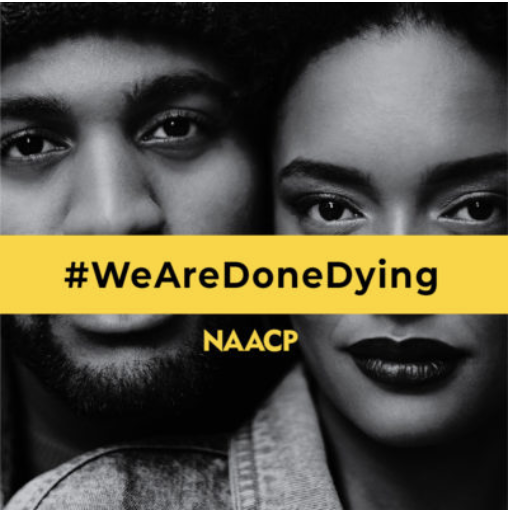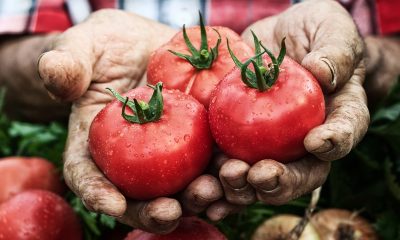The AFRO American Newspaper
Dream of D.C. Statehood a Reality This Time?
THE AFRO — If the excitement about D.C. becoming the 51st state feels a little like deja vu, it’s because it has been a topic of District chatter for years.
By George Kevin Jordan
It was the meeting that everybody and nobody saw coming all at the same time. In a wood paneled room last week at Rayburn House Office Building, in D.C., in a space designated for Committee on Oversight and Reform, D.C. representative to Congress, Eleanor Holmes Norton (D), flanked by Mayor Muriel Bowser, and Council Chair Phil Mendelson, to announce her plan to introduce H.R. 51, her bill to make D.C. the 51st state of the United States of America.
“Yesterday as the 116th Congress began, I introduced my first bill of the session – H.R. 51,” Norton said to the audience that responded in applause. One hundred and fifty five representatives of the House already co-sponsored the bill, Norton added.
If the excitement about D.C. becoming the 51st state feels a little like deja vu, it’s because it has been a topic of District chatter for years, and Norton has been in a David and Goliath battle for full statehood since she first held office.
During the 2016 D.C. general election the Advisory Referendum B District of Columbia was introduced to “ask the electorate if the Council should petition Congress to enact a statehood admission act to provide to the state of New Columbia and to approve a Constitution.”
According to data from the D.C. Board of Elections 85.69 percent of voters (244,134) approved the referendum. Then in 2017 Norton introduced HR.1291 to the Senate.
The movement has gained traction since then and now the support coming from D.C. carries a big gavel.
Speaker of the House Nancy Pelosi offered a statement regarding H.R. 51, the current Washington D.C. Admission Act: “The right to vote and to equal representation is the foundation of our freedom and a core pillar of our democracy. For too long, the residents of the District of Columbia have served our nation in uniform, paid taxes and contributed to the economic power and success of our country while being denied the full enfranchisement that is their right.
“Democrats are working to pass bold, ambitious legislation to restore the Voting Rights Act, finally grant full voting rights and statehood to the District of Columbia and bring back integrity to Washington to ensure our government works (for) everyone,” Pelosi added.
D.C. has a long history regarding state rights going back to the 1700s. But now with a Democratic House in place, the push for statehood could make it to the mountaintop.
An old and valid talking point for statehood is the fact that residents of the District don’t just pay federal taxes they pay more per capita than anywhere else in the nation, according to calculations done by the Associated Press in 2017.
“Twelve thousand dollars per capita is what you pay in federal taxes,” Norton said. “Higher than the taxes paid by or equal to any state in the union. Yet they pay those taxes without having any representation in the union whatsoever. And no final vote on the house floor.”
The pathway to statehood is still bumpy as Republicans run the Senate and the Oval office.
Norton laid out a two pronged plan to get the District there. The first thing is to seek a vote on H.R. 51 in the House of Representatives. Norton promised that a commitment was made by Elijah Cummings (D-MD), who will chair the House Oversight and Government Reform Committee, to hold a hearing and a mark up on the bill.
“At the same time we have to think strategically in this Congress,” Norton warned, mentioning the 60 votes needed in the Senate to move anything. “The second path will get D.C. closer to statehood by perfecting and improving the many outstanding sections of the Home Rule ACT that could easily pass in the Senate.”
The Home Rule Act of 1973 gave D.C. residents and legislators more autonomy to self govern and pass laws and budgets. But according to Norton, Home Rule is still limited in scope. By tweaking the law, it could provide the District with more power to make and pass budgets and make laws effective immediately.
Evanna Powell, a D.C. resident and ambassador for Statehood was on hand to show her support for a 51st state.
“I am a citizen of the United states that does not have all the rights, privileges and immunities that are enumerated in the Constitution of the United States,” Powell said. “I want what I am entitled to as a citizen of the U.S.”
Powell said she was enthusiastic about the bill’s chances to get passed, even with the current political affiliations of the Senate and President.
“Hope springs eternal,” Powell said. “I believe it’s possible now if residents of the District step forward and do what is needed to make us the 51st state.”
A representative from the Republican National Committee could not be reached for comment.
This article originally appeared in The Afro.
#NNPA BlackPress
NAACP Launches #WeAreDoneDying Campaign, Empowering Black and Brown Communities to Take Action Against Senseless Killings of African Americans
THE AFRO — The campaign is a Call-to-Action and highlights the NAACP’s policy interests and supported legislation for African Americans and people of color, a large demographic that is often left out of recovery effort conversations. The integrated and interactive content will create actionable steps for people to feel empowered by demanding action from their state’s elected officials on issues such as healthcare, education, criminal justice, economic justice, and voting rights.

Washington, D.C. (May 7, 2020) – The NAACP, the nation’s foremost social justice organization, has launched a campaign entitled #WeAreDoneDying, aimed at exposing the inequities embedded into the American healthcare system and the country at large. From COVID-19 to running while Black in America, the abuse faced by people of color, particularly African Americans is devastating.
The campaign is a Call-to-Action and highlights the NAACP’s policy interests and supported legislation for African Americans and people of color, a large demographic that is often left out of recovery effort conversations. The integrated and interactive content will create actionable steps for people to feel empowered by demanding action from their state’s elected officials on issues such as healthcare, education, criminal justice, economic justice, and voting rights.

“With crumbling economic infrastructure, our community members face tough choices as access to food, good jobs, and a quality education slips further away,” said Derrick Johnson, president and CEO, NAACP. “These issues are compounded by the lack of strong leadership from the White House. In the absence of adequate guidance, Black lives are adversely affected. We will no longer stand idle as our people suffer discrimination, marginalization, and are offered as disposable for poor decisions by this Administration.”
As the incidence of COVID-19 cases and deaths rise, the Black community is experiencing the worst outcomes. With more confirmed cases and deaths than any other country, African Americans are facing the brunt of this virus. The numbers continue to rise each day while states reopen non-essential businesses with little to no evidence that the country is ready.
“The COVID-19 pandemic has magnified the deep-seated racial disparity in America embedded in all aspects of life,” said Leon W. Russell, Chairman, NAACP Board of Directors. “The NAACP Empowerment Programs’ 111 years of advocacy and fighting for the rights of Black people positions us to lead the fight for our community’s interest during this time of uncertainty.”
Learn how you can join and get involved with the campaign by visiting NAACP.org.
Founded in 1909, the NAACP is the nation’s oldest and largest nonpartisan civil rights organization. Its members throughout the United States and the world are the premier advocates for civil rights in their communities. You can read more about the NAACP’s work and our six “Game Changer” issue areas here.
This article originally appeared in The Afro.
#NNPA BlackPress
The AFRO Awarded $100,000 Grant by Facebook Journalism Project
THE AFRO — After receiving more than 2,000 applications for the COVID-19 Local News Relief Grant Program from newsrooms across every state in the US, all US territories and Washington, D.C., we are providing grants ranging from $25,000-$100,000 to help publishers continue serving communities during the coronavirus outbreak. These grant recipients were selected through a process led by the Local Media Association (LMA) and The Lenfest Institute for Journalism and with significant contributions from the Institute for Nonprofit News (INN), Local Independent Online News Publishers (LION), Local Media Consortium (LMC), and the National Association of Broadcasters (NAB). Thanks to these organizations’ partnership and expertise, we were able to set up a program to meet the immediate and timely needs of these newsrooms.

Today, Facebook is announcing that more than 200 news organizations will receive nearly $16 million in grants through the Facebook Journalism Project’s relief fund for local news. These grants stem from $25 million in local news relief funding announced in March as part of Facebook’s $100 million global investment in news. It includes:
$10.3 million being awarded to 144 US local newsrooms as part of the COVID-19 Local News Relief Fund Grant Program. The fund is supporting many publishers who are hardest hit by this crisis: nearly 80 percent of recipients are family- or independently owned and more than half are published by or for communities of color.
$5.4 million being awarded to 59 North American newsrooms that participated in Facebook Local News Accelerator programs focused on subscriptions and memberships.
Remaining funds will be used throughout 2020 to support projects focused on longer-term sustainability in local journalism. This includes $2.5 million for Report for America, helping the group place 225 journalists in 160 local news organizations for their 2020 reporting corps.
Partnering with leading industry organizations like The Local Media Association and The Lenfest Institute for Journalism to move quickly, the Facebook Journalism Project has awarded more than 600 grants across the US and Canada since the pandemic began. Additional grant programs have been launched to support journalism around the world.
COVID-19 Local News Relief Fund Grant Program
After receiving more than 2,000 applications for the COVID-19 Local News Relief Grant Program from newsrooms across every state in the US, all US territories and Washington, D.C., we are providing grants ranging from $25,000-$100,000 to help publishers continue serving communities during the coronavirus outbreak. These grant recipients were selected through a process led by the Local Media Association (LMA) and The Lenfest Institute for Journalism and with significant contributions from the Institute for Nonprofit News (INN), Local Independent Online News Publishers (LION), Local Media Consortium (LMC), and the National Association of Broadcasters (NAB). Thanks to these organizations’ partnership and expertise, we were able to set up a program to meet the immediate and timely needs of these newsrooms.
“The COVID-19 pandemic has highlighted the critical role local news plays in our communities, while simultaneously threatening their very existence. Reviewing hundreds of applications on a tight timeline both illustrated the depth of need, but also highlighted the innovation that these small, independent publishers can provide for their communities when given the resources,” said Jonathan Kealing, INN’s chief network officer. “I’m excited to see new news products and more critical original reporting in these communities, thanks to Facebook’s support.”
The pool of grant recipients is notable in several ways:
- Nearly four in five are family- or independently owned.
- Half are published by or for communities of color.
- Nearly 40 percent are digitally native publishers.
- Just over a third are non-profits.
“We’re proud to support this diverse group of publishers — many of which are family- or independently owned. Not only are these journalists working tirelessly to serve people right now — they’re focused on transformation, building innovative local news businesses that can continue to serve communities beyond the current pandemic,” said Campbell Brown, VP of global news partnerships at Facebook.
The COVID-19 Local News Relief Grant Program was designed to provide support for US local news organizations serving a critical role for communities impacted by COVID-19. Funding is intended to a) respond to immediate community needs and/or b) offset some revenue shortfalls to help publishers maintain long-term sustainability during this crisis.
Facebook Journalism Project Local News Accelerator Program
Launched in 2018 to support local news businesses in their transformation to reader revenue-driven business models, the Local News Accelerator program has grown to more than 600 participants from more than 100 newsrooms worldwide.
he program includes a three-month period of workshops, now fully virtual, led by the Accelerator’s executive director Tim Griggs, regular reports on best business practices and grants administered by the Lenfest Institute and the International Center for Journalists.
Accelerator participants from the US and Canada are receiving relief grants to help safeguard the transformation they’ve achieved over the last several years and to capitalize on new opportunities. As these news organizations continue to test and learn, we’ll share their progress, actionable tips and results on the Facebook Journalism Project website.
The coaches in the Facebook Accelerator went “above and beyond to help us, teaching practical concepts and tools that we could use right away and taking time to talk through problems. Our cohort members have been encouraging, collaborative and generous with their knowledge and experience,” said Jennifer Napier-Pearce, editor of the Salt Lake Tribune, a participant in the 2020 Subscriptions Accelerator program. “We’re so grateful to Facebook for supporting local news at such a precarious time.”
The Facebook Journalism Project will host a webinar session on Friday, May 8th at 1 p.m. EST/10 a.m. PST titled “Practical Lessons to Accelerate Your Reader Revenue Strategy.” Led by Accelerator Executive Director Tim Griggs and Accelerator Program Manager David Grant, the session will give a distilled look at key tactics and strategies drawn from Accelerator publishers. To join, register to receive information about the program here: FB.me/BootcampRegistration.
News reporting has never been more critical. We’re proud to support all these news organizations as they provide critical reporting to their local communities during this challenging time.
Sign up for the Facebook Journalism Project newsletter to receive updates on Facebook’s ongoing efforts to support the news industry during the COVID-19 crisis.
This article originally appeared in The Afro.
#NNPA BlackPress
VIDEO: THE RUN DOWN – DJ D-NICE / #Homeschool House Party
THE AFRO — Host Micha Green talks about DJ D-NICE’s online house party, and trending topics in the AFRO American Newspaper.
-

 #NNPA BlackPress4 weeks ago
#NNPA BlackPress4 weeks agoLIHEAP Funds Released After Weeks of Delay as States and the District Rush to Protect Households from the Cold
-

 Alameda County4 weeks ago
Alameda County4 weeks agoSeth Curry Makes Impressive Debut with the Golden State Warriors
-

 #NNPA BlackPress4 weeks ago
#NNPA BlackPress4 weeks agoSeven Steps to Help Your Child Build Meaningful Connections
-

 #NNPA BlackPress4 weeks ago
#NNPA BlackPress4 weeks agoSeven Steps to Help Your Child Build Meaningful Connections
-

 #NNPA BlackPress4 weeks ago
#NNPA BlackPress4 weeks agoTrinidad and Tobago – Prime Minister Confirms U.S. Marines Working on Tobago Radar System
-

 #NNPA BlackPress4 weeks ago
#NNPA BlackPress4 weeks agoThanksgiving Celebrated Across the Tri-State
-

 #NNPA BlackPress4 weeks ago
#NNPA BlackPress4 weeks agoTeens Reject Today’s News as Trump Intensifies His Assault on the Press
-

 #NNPA BlackPress4 weeks ago
#NNPA BlackPress4 weeks agoBreaking the Silence: Black Veterans Speak Out on PTSD and the Path to Recovery
























































